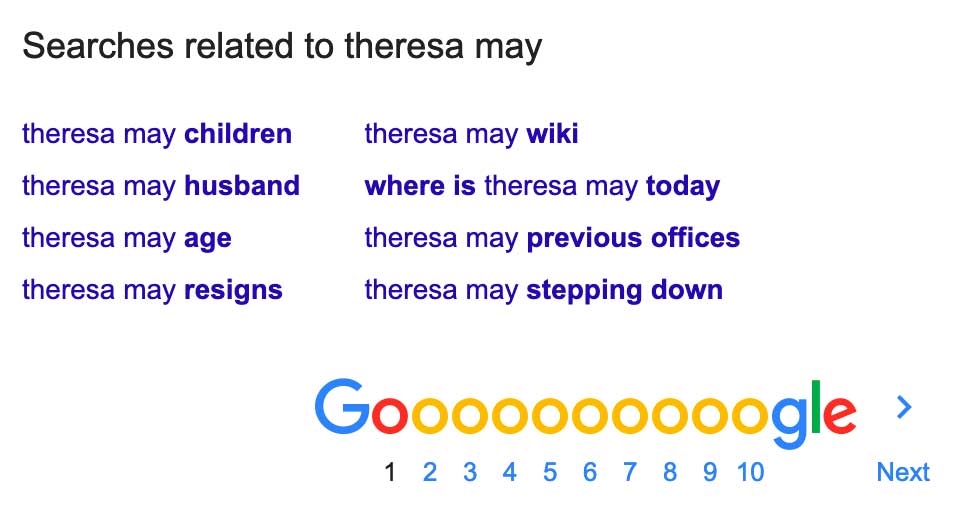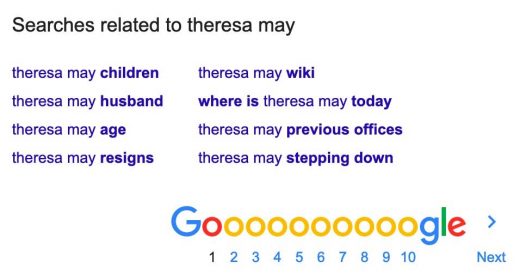The Problem With Related Searches in Reputation Management Campaigns
— August 1, 2019
Using “related searches” for a reputation management campaign may provide short-term improvement, but cause long-term problems by associating a client’s brand with a negative query. Here’s how to avoid that.
Be careful when choosing topics and search phrases
Many reputation companies introduce a lot of content to search results. Within this content they will place search terms. The search terms they place are intended to rank well in Google search results when someone searches (queries) their client.
The idea is that if the reputation management company places enough content on the web with various iterations of a particular search phrase, Google will choose to rank some of it more visibly. Properly promoted, this can have the effect of placing new positive content above content with negative sentiment about their client. This is one form of search result “suppression”. It can also be a form of web spam. Google says Web spam is bad.
The search phrases these reputation firms use are often taken from “related searches”. Related searches are often found at the bottom of a search result page. They look something like this:

As you can see in the example above, there are many variations of a search phrase that can be used. Google shows only the top related phrases, but there are many more that are not shown.
If a reputation company were executing a campaign for British Prime Minister Theresa May, they might often use these terms as search phrases embedded in the content they are creating. They would place this information in a number of places that might include:
- The URL of content. Ex: www.something.com/theresa-may
- The headline of content
- In sub-headings on a page
- Within the body of the content
- In the anchor text linking from another page to the one they are promoting
- In the filenames of images they embed in the page
The problem with the related searches method
The related searches method of search phrase selection suffers from a major drawback. Before we explain what that is, let’s take a look at how Google deciphers the meaning of a given web page.
Google patents tell the story
According to one Google patent called “System and method for providing search query refinements” when Google receives a search query, it will look at web documents in its database that it has associated with the search phrase (query). Then, it will look at the content of those web pages to understand the concepts contained within.
If a reputation management company uses related searches at one point in time, and then uses those search terms in the content they are creating, it will often perform well for the search phrase. But then you have a situation where times change and the content doesn’t.
Google patents related to understanding context and content
Other related Google patents that either directly or indirectly affect the way the search engine understands content and context include:
- Determining query term synonyms within query context
- Determining user intent from query patterns
- Suggesting related search queries during web browsing
Why related search key phrases can be bad
To understand why this can be detrimental, think of it this way. If Theresa May engaged a reputation management firm to clean up search results for the term “Theresa May resigns” they might create a lot of content using terms around that term. They may create articles and blog posts with the terms “Theresa May” and also the word “resigns” sprinkled throughout. This may work well in the short term, as Google could respond by ranking the content the reputation company created well for that term.
But then time goes by…
Imagine it is six months later, Theresa May has moved on and has now realized her true calling in life, to be a pet store employee. People are no longer searching the term “Theresa May resigns” much if at all. All eyes are now on Boris Johnson. But all the content created by the reputation agency around that “resigns” term survives. In fact, the reputation company promoted that content by building links to it all over the web. (Link building is a form of SEO).
Even though it is no longer relevant, Google continues to use that content the reputation firm created as a reference and strongly associates the term “resigns” with “Theresa May”. If the reputation management company does not remove or edit that information Google may associate the word “resigns” with her forever to some degree.
Thus, by using short-term related search keywords for a long-term campaign the reputation company may inadvertently make the problem worse.
Best practices for related search-based keyword campaigns
If a reputation management agency chooses to use related search-based search terms, they should only be used on editable sites. In other words, these types of search terms should be changeable over time. If the reputation management strategy calls for a short-term, or trending, query, that query should not be used as the basis for content that cannot be changed.
Ideally, as the short-term phrase is used less often, the content can be edited, which, over time, can change the relevance of those terms to the subject.
The last thing a company that manages brand reputation should do is make the problem worse by amplifying the relevance of non-flattering content by seeding the internet with even more references to it.
Correcting short-term search phrases
If the URL contains the no longer relevant search phrase it can sometimes be changed, but doing so might, in effect, create a new web page. The new page would not have the inbound links and other SEO-related factors the original did. In this case, a 301 redirect from the old URL to the new one is the preferred means of change. If a 301 redirect is not an option, the URL can be left as-is, but the content of the page should be changed so as not to include the old search term. The best case would be to change the contents of the page to match the long-term search phrase sought.
If the content of a page that contains the old search term cannot be altered, and the URL cannot be redirected (301) to a new one to retain SEO, the page should (generally) be deleted, and a new page created if possible.
Digital & Social Articles on Business 2 Community
(65)


